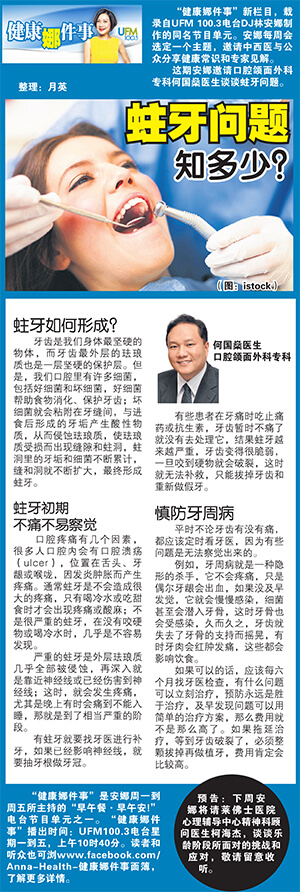 This article first appeared in Lianhe Wanbao (联合晚报) on 1 May 2016. For the benefit of those who missed the article, or who cannot access the publication in Chinese, we have summarized the content of the article below.
This article first appeared in Lianhe Wanbao (联合晚报) on 1 May 2016. For the benefit of those who missed the article, or who cannot access the publication in Chinese, we have summarized the content of the article below.
“Anna Health” is a column in Lianhe Wanbao that is reproduced from the similarly named radio programme “健康娜件事” on UFM 100.3 (Singapore radio station) hosted by DJ Anna. Every week, Anna would invite a doctor to share health knowledge and insights with her listeners.
How does tooth decay form?
Teeth may be the strongest part of our human body, especially enamel, the outer layer. Nonetheless, it is still susceptible to decay.
Our mouth is filled with numerous bacteria, both good and bad. The good bacteria helps to digest food and protect our teeth, while the bad bacteria stick on the teeth, reacts with food consumed to produce acids that attack our teeth. This acid attack on the enamel causes mineral loss. Over time, as the acid attacks continue, plaque and bacteria accumulates, and ultimately resulting in cavities/tooth decay.
Tooth decay does not cause pain in its early stages
When pain is felt in your mouth, it may be due to various reasons such as ulcers, cracked tooth, gum infections etc. Nonetheless, in early stages of tooth decay, minimal pain is experienced – discomfort or sensitivity is only felt when one consume hot or cold food/drinks.
In serious cases of tooth decay, the tooth enamel would have been mostly eroded and the decay would proceed deeper, towards the pulp, affecting the nerves. Only during then would pain be felt. If you find that you are unable to sleep due to the throbbing pain in your mouth, it is most likely that tooth decay has taken place and is at its advanced stage.
In the early stages of tooth decay, visit a dentist for a filling. If it has worsened to affect the nerves, root canal treatment would be needed.
Some patients tend to consume painkillers or antibiotics when they have a toothache. However, this is only a temporal solution to the pain. When treatment is delayed, the decay worsens, the tooth gets weaker and may ultimately break when biting hard foods. When this happens, the tooth would be unsalvageable and the only solution would be to extract the “dead” tooth and replace it with dental restoration treatments.
Prevent gum disease
Whether any toothache is felt, visit your dentist regularly as certain dental issues are only detected by a dental professional through a routine check-up. For example, gum disease is known to be a “silent-killer” as no pain is felt during the initial stages. There may only be gums that bleed when brushed. If it is not detected in a timely manner, bacteria continues to attack the gum and supporting bone and eventually, cause the teeth to become loose.
Make a point to visit your dentist every six months so that any dental issue can be detected and treated before it worsens. When detected early, dental issues can be solved with simpler treatments. It not only gives you peace of mind, it also brings about cost savings.
Anna Health is a radio programme hosted by DJ Anna. To listen, tune into UFM100.3 every Monday to Friday at 10.40am.





